When voters in four states passed anti-gay constitutional amendments in November, it stunned a gay community for whom tangible progress felt dizzyingly close at hand in 2008. The success of Proposition 8, which banned same-sex marriage in California, and the passage of similar measures to eliminate family protections in Arizona, Arkansas and Florida, sparked the most vivid outpouring of protest from the LGBT community since the murder of Matthew Shepard in 1998.
Just weeks after the disaster at the ballot box, however, disappointment and raw anger have already subsided enough to reveal glimmers of a silver lining. Beyond the loose emotional outrage, advocates are weighing how to respond in a tactical way, motivated by recent seismic shifts in national politics that appear favorable to gay rights.
“The summary of the prognosis is it’s terribly exciting and there is a lot more work to do,” says Rea Carey, executive director of the National Gay and Lesbian Task Force.
In the immediate term, advocates must weigh whether to address the state amendments on legal or political fronts, while in the long run, they face the ever-present task of changing public attitudes, one person at a time. Despite the painful defeats, the march toward marriage equality is moving faster than ever before.
“We remain very bullish that marriage equality continues to move forward, with ups and downs,” said Marty Rouse, national field director of the Human Rights Campaign. “2009 should be a good year for the marriage equality movement.”
Indeed, observers are hopeful that gay marriage bills could pass the state legislatures of New Jersey, New York and Vermont, avoiding the backlash that can result when gay marriage arrives by court ruling, as in California, Connecticut and Massachusetts.
With the current rate of progress in the legislatures and the courts, Rouse estimates that in five years, a total of 26 states could offer marriage equality or some form of gay partner benefits. Maryland and Minnesota could emerge soon as prominent players, he says, and Oregon may become the first state to overturn a gay marriage ban.
“We have come so far, so fast,” says Rouse. “In eight years, we narrowed the gap from 22 to four points.”
Those statistics refer to the margins of victory for Proposition 22, a same-sex marriage ban passed by California voters in 2000, versus Proposition 8, which passed much more narrowly in 2008. The Supreme Court overturned Proposition 22 in May, in a decision that paved the way for more than 15,000 same-sex couples to marry legally.
Then Proposition 8 crashed the party.
California: Fighting Prop 8 in the Courtroom
While Proposition 8 may have passed by a slim, four-point margin of 52 to 48 percent, the practical result of its success is the same had it won by a landslide. In effect, thousands of legally married same-sex couples were stripped of a right previously granted by the high court, and thrust into legal uncertainty by a process gay rights advocates consider downright twisted.
“This was an impulsive, momentary expression of majority bias,” says Shannon Minter, legal director of the National Center for Lesbian Rights and lead counsel for same-sex couples in the California marriage case. “If this could happen to gay people, it could happen to anybody.”
Minter and colleagues from the American Civil Liberties Union and Lambda Legal have filed a lawsuit challenging Proposition 8, which the Supreme Court put on an expedited briefing schedule. Oral arguments could be heard as early as March 2009.
Minter expresses confidence in their approach, which relies on the argument that Proposition 8 was so far-reaching in scope that it was actually a revision, not a mere amendment, to the state constitution. In that case, they argue, Proposition 8 required a two-thirds vote by the state legislature and a subsequent majority vote by the people to pass, rather than simple approval by a majority of voters.
“The California constitution can’t be changed in such a serious way to take away the right of a minority group through a majority vote,” says Minter. “If that was the case, you might as well not have a constitution.”
Should legal efforts turn up short, political tacticians may try to repeal Proposition 8 through another ballot measure as early as 2010. Equality California, the group that led the campaign against Proposition 8, announ-ced on Nov 12 that it would begin gathering the one million signatures needed to put the question to voters again.
Arizona, Arkansas and Florida: Seizing the Moment
Although much of the national attention has focused on California, where Proposition 8 eliminated a right previously recognized by the court, advocates in Arizona, Arkansas and Florida also lost fundamental marriage and family rights at the ballot box. After their own days of rallies and tears, their response has been to organize and identify allies who can help with the work ahead, often on the legislative front.
In Arizona, the success of Proposition 102, another constitutional amendment to ban same-sex marriage, holds scant practical impact because the state previously passed a law against same-sex marriage.
“Marriage is already limited,” says Sam Holdren, public affairs director for Equality Arizona. “The vote didn’t change that.”
In 2006, Arizona became the first state to reject an anti-gay marriage amendment when voters did not pass a measure that would have banned gay marriage as well as domestic partnerships. This time, the removal of domestic partnerships from consideration is widely believed to be the reason Proposition 102 passed in Arizona by a margin of 56 to 44 percent.
Rather than try to repeal Proposition 102, which would cost $500,000 and require legislators to put it on the ballot, gay rights advocates aim to turn their attention to other important legislative goals. Gay Arizona residents still lack many basic protections.
“We will work with the conservative legislature and make progress in incremental steps,” says Holdren. He says that domestic partnerships, safer schools, adoption rights and workplace discrimination are on their agenda.
Where allies are concerned, Arkansas opponents of a ballot measure against gay adoption received support from political heavyweights like Governor Mike Beebe, Attorney General Dustin McDaniel and others, but this was not enough to turn the tide in the deeply conservative state. Proposed Initiative 1, which passed by a margin of 57 to 43 percent, bans unmarried couples from adopting or fostering children. Because gay people have no marriage rights in Arkansas, they are effectively prohibited from adopting.
“It’s been a real galvanizing moment,” says Debbie Willhite, executive director of Arkansas Families First. “This battle brought out the progressive community in Arkansas that usually has not worked on issues in the past. What brought them out is that this is such a bad law for children.”
Willhite says that in order to remove the adoption ban, her group and allies could try a ballot petition in 2010, ask the legislature to repeal it, or attempt a court challenge, which may offer the fastest route. They hope to respond quickly in order to discourage anti-gay forces from making adoption a ballot box trend.
“It has always been our fear that this would be the next wedge issue,” says Willhite.
In Florida, where Amendment 2 passed with 62 percent approval to outlaw gay marriage and equivalent unions like domestic partnerships, leaders want to harness the disappointing experience into positive political change.
“It’s one of those moments where everyone is paying attention,” says Nadine Smith, executive director of Equality Florida. Although there is no immediate plan to repeal the amendment, her group plans to press legislators in Tallahassee, the state capital, to add sexual orientation and gender identity protections to the Florida civil rights law.
While a majority of Floridians may not have supported same-sex marriage on Nov 4, Smith points to poll results released after the election showing that 89 percent of state residents favor equality for gay people in other critical areas, like employment and housing.
“This election gave us a good way of looking at our constituency,” says Smith. “For all intents and purposes, this was the first vote that asked people where they stand.”
The campaign against Amendment 2 also developed ties with other groups like churches, labor unions and senior citizens, who could be severely affected by the ban on domestic partnerships, a common choice for widows in a state popular among retirees.
“We made stronger alliances with other progressive organizations,” according to Smith. “We see opportunities for a quantum leap in that regard.”
Congress and the President: Setting an Inclusive Agenda
Despite the setbacks on the state level, the 2008 election reinforced the growing power of the gay community in national politics, strengthening bonds with Capitol Hill and the White House that will prove critical to implementing federal gay rights legislation in the years ahead.
“We are no longer a group on the outside trying to persuade people to be supportive,” Congressman Barney Frank (D-MA) told a group of openly gay elected officials at the annual conference of the Gay and Lesbian Leadership Institute in Washington, D.C., in December. “We are now a major part of the governing coalition of this country.”
More than ever before, gay people were a visible part of the 2008 campaign, garnering high-profile mentions in some of President-elect Barack Obama’s major speeches. Meanwhile, Colorado entrepreneur Jared Polis, a Democrat from Boulder, will join Barney Frank (D-MA) and Tammy Baldwin (D-WI) as the third openly gay member of Congress in January. There has even been talk about the appointment of an openly lesbian Secretary of Labor, Mary Beth Maxwell, the founding executive director of American Rights at Work and former deputy field director of NARAL Pro-Choice America.
Congressman Frank predicts the next congress would pass a fully inclusive hate crimes bill early on, and that prospects for passing an inclusive Employment Non-discrimination Act were strong. He also suggested that the “Don’t Ask Don’t Tell” policy, which bars gays and lesbians from serving openly in the military, would be reassessed once the country makes progress on exiting Iraq.
“Less than 20 years from now,” he said, “we will have succeeded in establishing full equality for LGBT people across the board.” Such optimism may feel far from the dark days immediately following the state amendments passed in November, but the generally positive outlook for gay rights is grounded in the very arc of history.
“Any stumble is just that, a stumble,” says Evan Wolfson, executive director of Freedom to Marry. “It’s not the end. The truth of the matter is, civil rights and human rights are always attainable, and never easy to reach.”

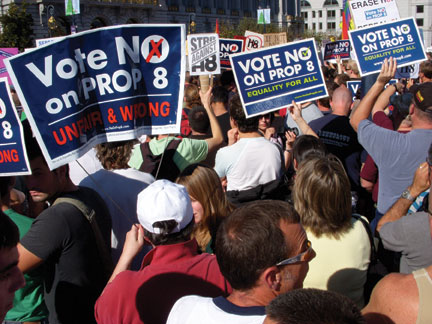
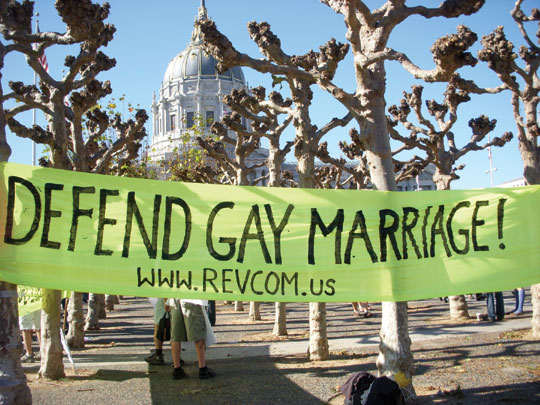
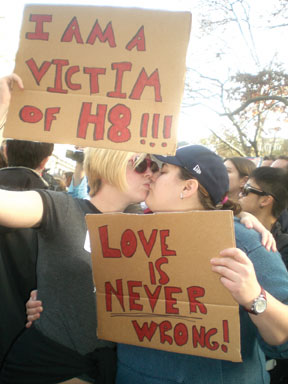
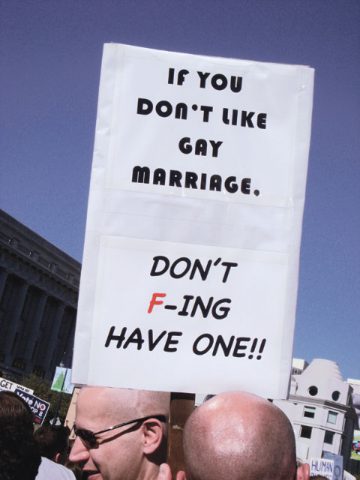
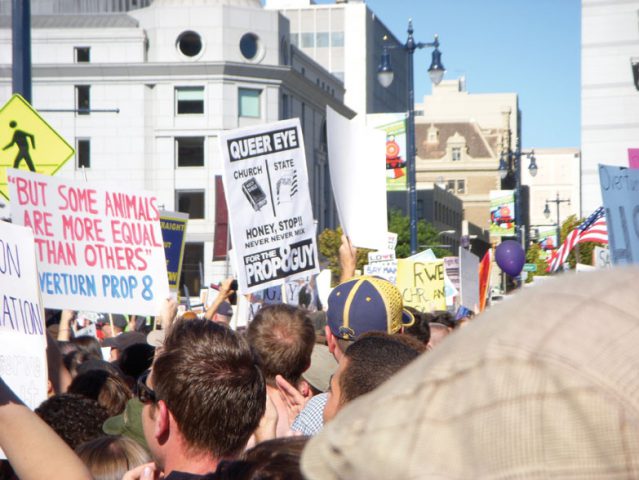
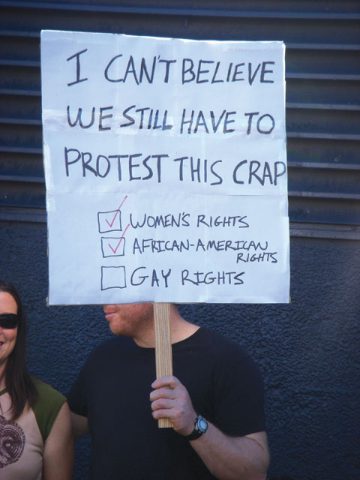
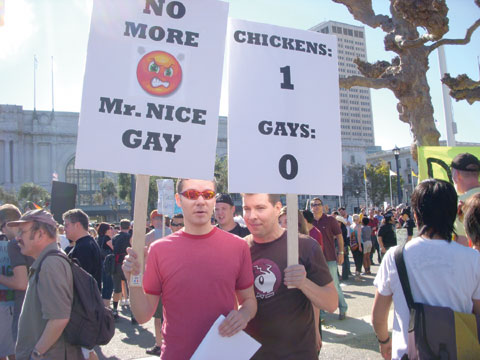
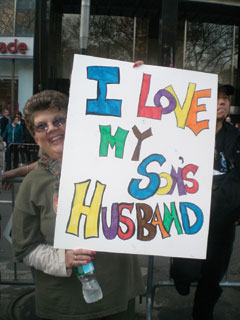
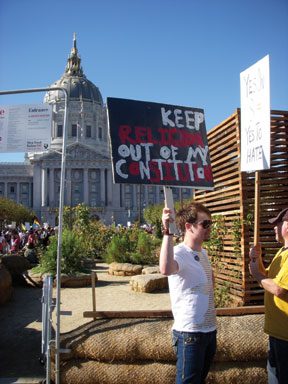
What Do You Think?